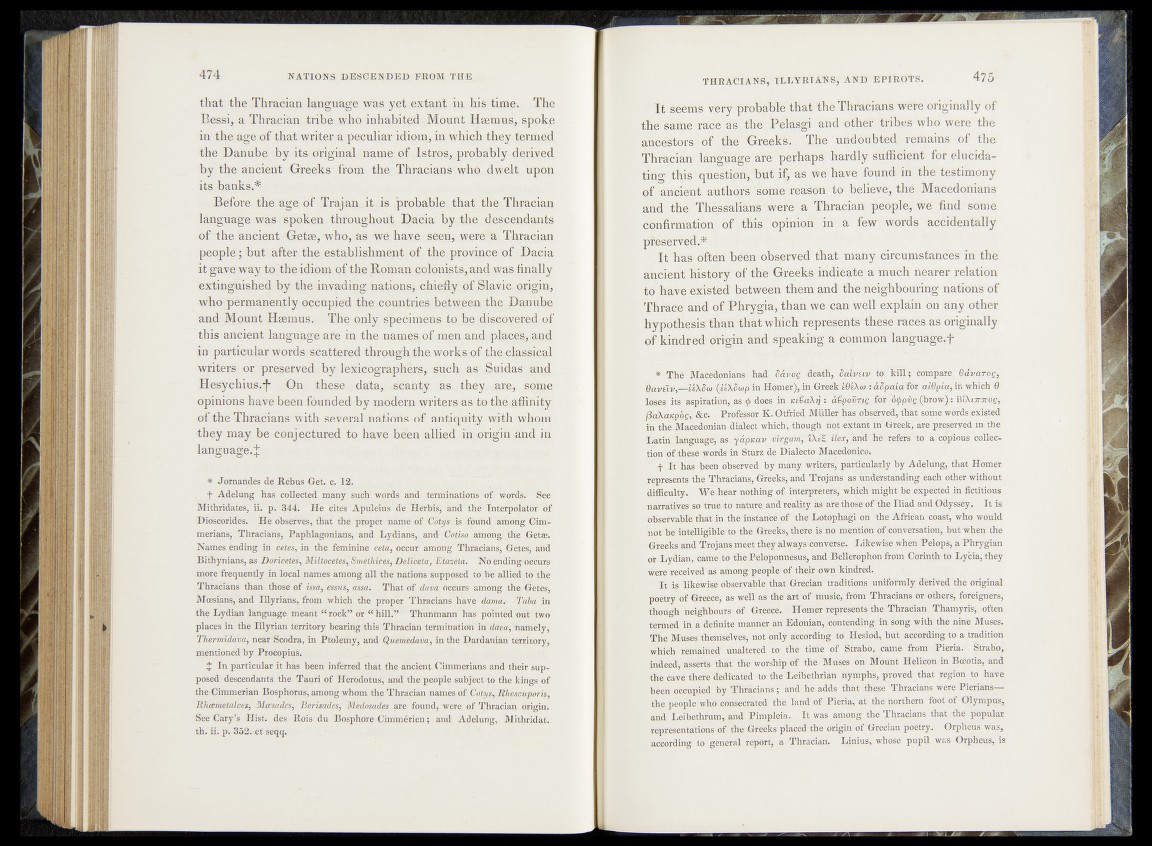
that the Thracian language was yet extant in his time. The
Bessi, a Thracian tribe. w ho inhabited Mount Hsemus, spoke
in the age of that writer a peculiar idiom, in which they termed
the Danube by its original name of Istros, probably derived
by the ancient Greeks from the Thracians who dwelt uPon
its banks.*
Before the age of Trajan .it is probable that the Thracian
language was spoken throughout Dacia by the descendants
of the ancient Getae, who, as we have seen, were1 a Thracian
people; but after the establishment of the province of Dacia
it gave way to the idiom of the Roman colonists, and was finally
extinguished by the invading nations^ chiefly. Slavic origin,
who permanently occupied the countriesjbetween'the Danube
and Mount Hsemus. The only specimens to'be discovered of
this ancient language are-in the n.ame£M»f men and pl&q^piid
in particular words scattered through the w@rks of the classical
writers or preserved by lexicographers, such a« guides-; and
Hesychius.'p On these data, scanty as,, they^.ave, s e ^ f
opinions have been founded by modern writers as to the affinity
of the Thracians with several nations of antiquity with whom
•they may be conjectured to have been allied in origin, and in
language.^
* Jornandes de Rebus Get. c. 12.
•f Adelung has collected many such words and terminations of words'. '->S4e
Mithridates, ii. p. 344. He cites Apuleius' de Herbie, and the Interpolator "of
Dioseorides. He observes, that the proper name of C o ty sA s found among Cimmerians,
Thracians, Paphlagonians, and Lydians,, and Cotjso. afnong jhe
Names ending hi cetes, in the feminine ceta, occur among Thracians, Getes, and
Bithynians, as D o ric e te s ^M ilto c e te s , Sm e th ices, D e lic e ta , E ta ze ta .
more frequently in local names among a ll the nations supposed to be allied to the
Thracians than those of issa, essus, assa. That of d a va occurs among the Getes,
Moesians, and Illyrians, from 'which the proper Thracians have d am a ,
the Lydian language meant “ rock” or t( hill.” Thunmann has pointed dtil two
places in the Illyrian territory bearing this Thracian termination in d a va , namely,
T h e rm id a v a , near-Scodra, in Ptolemy, and Qu em ed a va , in the Dardanian territory,
mentioned by Procopius.
% In particular it has been inferred that the ancient. Cimmerians and their supposed
descendants the T auriof Herodotus, and the people subject to the kings of
the Cimmerian Bosphorus, among whom the Thracian names of C cty s, R h e sc u p o ris,
Rhcemetalces, Mcesades, Berisa d e s, Mednsades are found, were of Thracian origin.
See Cary’s Hist, des Rois du Bosphore Cimm&rien; and Adelung, Mithridat.
th. ii. p. 352, et seqq.
It seems very probable that the Thracians were originally of
the same raef^as the Pelasgi and other tribes who were the
ancestors of the Greeks. The undoubted remains of th e
Thracian language.fire perhaps, hardly sufficient for elucidating
this question,"but if/as we have found in fh i testimony
of ancient authors' ^ome reason to believe, the Macedonians
and the Thessalians were a Thracian people, we find some
confirmation of this opinio» in a few words accidentally
breserved.^; &
;!;It has often'been’observed’ that many circumstances in the
ancient history of the Greeks- indicate a much nearer relation
§$ have existed between them and ^ n e ig h b o u rin g nations of
Thrace’and of Phrygia, than we can well explain on any other
hypothesis than that which repr^ents these/rfides Us originally
of kindred origin and speaking a comm'on language.f
* The Macedonians had, ('S a ^ g i i to k ill; comparfer'0^^3^,”'.
H o ^ e r ^ ' - i n / G f ’for which 9
loses its aspiration, as (j> does' p-^brovajj's BiXi7r7ro£,
\ S ^ q K p & , '«^c. • Rrlofessor, K. Orfrie^ JViuller has observed, that.sbfte words existed
iti the iyTflppi1f»nia.n dialect which; th o d ^ lio t »extant hu Greek, are preserved intthe
Latin ^language, as y a p ' i k j d t i and he refers to a, copious' collection
of _th§se words in Sturz de Dialecto Macedonico.
^TV It has been observed by many writers, particularly by Adelung, that Honier
represents the Thracians, Greeks, and TrojahS as understanding each other without
difficulty- We-hear nothing of interpreters, which might be expected' in fictitious,
narrarives'so true'to nature andreality as are those of the Hi&d and Odyssey. <' Iti&
observable that in the instance of the Lotophagi on the African coast, who would
I bVintelligible to the "Greeks, there is no menri'otf 'of-cdnvei-sStfe^ but when the
Greeks and Trojans meet they always converse. Li^e^jife when Pelops, a Phrygian
or Lydian; came to'the Peloponnesus, ahd Bdflerophdn¥rbm Corinth to Lyfcia, they
were received as among people of fh'eir own kindred.
h I t ia likewise observable that Greciati traditions uniformly dferifetf the original
poetry of Greece, as well as the art of^&d§ife,’'from$'Thfadhns on others* foreigners,
though neighbours of Greece. Homer represents the Thracian Thamyris, often
termed ih a definite manner an Mqniah’,/contending in Song with the nine Muses.
The Muses themselves, hot oifiy according^® Hesiod, but- according‘to a traditfOfi
which remained unaltered to the -tifM',o'f Strabo'/ came from Pieria.' Strabo/
indeed, asserts that the worship’fif the MuSes on Mount Helicon in Boeotia, and
the cave there dedicated to theLeibethrian hymphs, *pfiovfed that region to have
been occupied by Tliracians^atEfl 'he adds '•flibse Thracians were Pieriabs—
the people who consecrated the land o f Pieria, JK'e northern foot Of Olympus,
and Eeibethrup, and Bimpleia. I t was among the Thracians that the popular
representations of the Greeks placed the origin of Grecian poetry. Orpheus was,
% according to general report, a Thracian. Linius, whose pupil w&s Orpheus, is